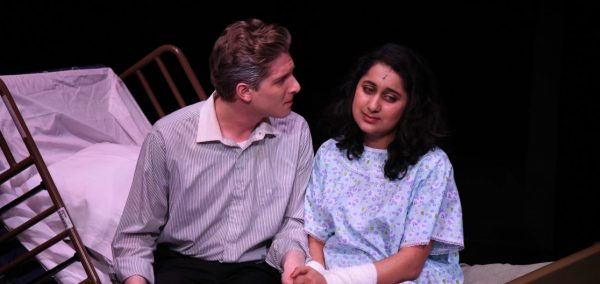
‘Next to Normal’ is much more than a musical at Bucknell
It represents a dialogue about mental illness that needs to occur on campus
This past weekend, Bucknell’s Department of Theatre and Dance held its winter main stage musical, Next to Normal. The show opened on Thursday night, with donations going to the Transitions Center in Lewisburg.

The show details the lives of a suburban family, which appears to be “normal” on the outside but struggles with many issues. The main character and mother, Diana, has been trying to cope with bipolar disorder with hallucinatory aspects for 16 years. As the show continues, the audience is able to see how profoundly Diana’s illness affects her entire family: her husband, Dan, their daughter, Natalie, and their deceased son Gabe. Diana’s inability to let go of Gabe’s memory is the primary conflict of the show, combined with the unpredictable behavior of her mental illness. People that struggle with mental illness are incredibly strong, and this show is a testament to Diana’s strength, along with that of her family.

I personally struggle with mental illness, so being exposed to this show was quite emotional for me. I have a very close connection to Diana through what we both experience, which is to say: a lot. It’s extremely important that the Mainstage brought an important message about mental illness, particularly on our campus, and here’s why:
The show illustrates the ways that mental illness can affect a family’s dynamic
Diana’s illness greatly affects her family. She goes through dozens of trials with different medications, different forms of therapy, which coalesces into a suicide attempt and hospitalization. After she undergoes electrotherapy, she has a relapse and begins to hallucinate once again. The reason this is so crucial is because mental illness is not neat, it is not tidy, it is not one-and-done with treatments.

Seeing Dan’s desperation when Diana relapses, Natalie’s sadness and frustration because of her mother’s distance, and Diana’s preoccupation with her dead son Gabe are all painful representations of how mental illness touches the lives of everyone, not just the person struggling.
Next to Normal shows how awful the experience of medication can be
Just because someone is on medication, does not mean that it will help in any way whatsoever. Medication is a weird thing: it can work very well for a few weeks/months and then stagnate and create huge issues. Medication often has to be balanced out by other medications, because side effects can really mess up someone’s daily life.

Many people that I have spoken to are shocked when medications and certain therapies don’t work. One day, they might seem better, but then a few weeks later, they can be very low and begin to harm themselves.
This issue is highlighted significantly in the haunting song “My Psychopharmacologist and I” during which Diana goes through weeks and several rounds of medications, each having different somatic effects while also altering her thoughts. It shines a light on the painful reality of what mental illness and medication is like.
Therapists don’t always have the answer to your questions
Diana and I both have experienced therapists that haven’t been well-suited to our needs. Mental illness is not something that you can “just fix” or “just get over,” and it takes time to find a therapist that can properly treat you. Next to Normal shows this as Diana has been in therapy and on medications for over 15 years, and has been fairly treatment-resistant.

There is a huge stigma surrounding mental illness on our campus
On our campus, there seems to be a well-known stigma that going to the CSDC means there is “something wrong” with you. Even if you don’t have serious issues, psychotherapy can’t hurt. It can be very cathartic to talk to someone about your life problems, especially someone that is a professional and can help you out.

There needs to be more education about the prevalence of mental illness, the stereotypes that shape our understanding of mental illness, and the real-life struggles of those that have a mental illness. Next to Normal does a great job tackling a lot of these issues, but one show can’t do it alone.
Bucknell needs to have more of a conversation about mental illness on campus, but this starts with the students. It’s really important to educate yourself about these issues, and about issues that you might not experience, so that you can understand their profound effect on your peers.
Photos courtesy of the Bucknell Department of Theater and Dance and Gordon R. Wenzel.
